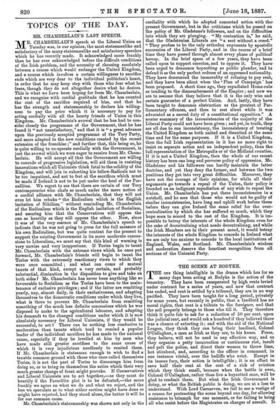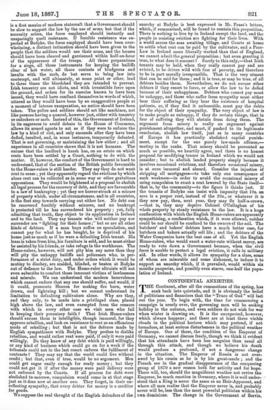THE SCENE AT BODYKE.
THE one thing intelligible in the drama which has for so many days been acting at Bodyke is the action of the tenantry. They have been exasperated by high rents levied under contract for a series of years, and now that contract has ended, and rent is settled by a tribunal, they are in no way pacified. They have been taught for a long period, privately for some years, but recently in public, that a landlord has no moral rights, that rent is a tribute to the foreigner, and that the soil properly belongs to those who till it. They therefore think it quite fair to ask for a reduction of 50 per cent, upon the judicial rent, and would ask a hundred if they believed there was a chance of extorting it; and with the aid of the National League, they think they can bring their landlord, Colonel O'Callaghan, a man as Irish as they are, to his knees. Force, they believe, will not be used in any effective way, and so they organise a petty insurrection or continuous riot, insult and pelt the police, and direct their women to throw lime, hot stirabout, and, according to the officer in command, in one instance vitriol, over the bailiffs who evict. Except in its insane fury, their action is intelligible ; it is an effort to save half their rent at the cost of a risk of eviction which they think small, because when the battle is over, Colonel O'Callaghan, rather than live a boycotted man, will be glad to readmit them. But what the Irish Government is doing, or what the British public is doing, we are at a loss to understand. With Lord Carnarvon, we fail to see a vestige of a reason for protracting the scene beyond one day, for allowing resistance to triumph for one moment, or for failing to bring all who resist before the Magistrates on charges of assault. It is a first maxim of modern statecraft that a Government should be slow to support the law by the use of arms, but that if the necessity arises, the force employed should instantly and unsparingly quell resistance. If forcible resistance was ex- pected at Bodyke, the force employed should have been over- whelming, a distinct intimation should have been given to the people that the soldiers would use their arms, and the houses should have been cleared and garrisoned within half-an-hour of the appearance of the troops. All those preparations for a siege, all those instruments for keeping the bailiffs clear of hot water, all those contests of bludgeons and insults with the mob, do but serve to bring law into contempt, and will ultimately, at some point or other, lead to three times the bloodshed they are intended to prevent. Irish tenantry are not idiots, and with irresistible force upon the ground, and orders for its exercise known to have been issued, they would have confined themselves to words of which, uttered as they would have been by an exaggerative people at a moment of intense exasperation, no notice should have been taken. The police and soldiers should act like machines, not like persons having a quarrel, however just, either with tenantry or onlookers or mob. Instead of this, the Government of Ireland, in its eagerness to avoid debate in the House of Commons, allows its armed agents to act as if they were to enforce the law by a kind of riot, and only succeeds after they have been defied, insulted, and, in some instances, temporarily defeated. That is not governing, or maintaining the law either ; and all experience in all countries shows that it is not humane. The excuse that the landlord is harsh has, on an estate on which rents have been settled by a Court, nothing to do with the matter. If, however, the conduct of the Government is hard to understand, that of the section of the British public favourable to the Home-rulers is still harder. They say they do not want rent to cease ; yet they apparently regard the evictions by which alone rent can be collected as in some way or other gratuitous oppressions. They would be frightened at a proposal to abolish all legal process for the recovery of debt, and they are favourable to a law of bankruptcy ; yet they are horror-struck at a seizure of property which, under all circumstances, and in all countries, is the first step towards carrying out either law. No debt can be recovered forcibly without seizures, and no bankrupt is protected till he has surrendered his property ; yet, fully admitting that truth, they object to its application in Ireland and to the land. They say tenants who will neither pay nor surrender are "fighting for their homes ;" but so are all other kinds of debtors. If a man buys coffee on speculation, and cannot pay for what he has bought, he is deprived of his home just as much as if he were a defaulting Irish tenant. His lease is taken from him, his furniture is sold, and he must either be assisted by his friends, or take refuge in the workhouse. The Home-rulers, however, will not pity him any more than they will pity the unhappy bailiffs and policemen who, in per- formance of a strict duty, and under orders which it would be mutiny to disobey, are scalded, blinded, or beaten at Bodyke out of defiance to the law. The Home-ruler altruists will not even subscribe to comfort those innocent victims of lawlessness and misrule. We can understand the modem benevolence which cannot endure that any one should suffer, and would, if it could, prosecute Heaven for making fire burn, water drown, and lightning kill ; but we cannot understand its limitation to defaulting cultivators alone. Why are they, and they only, to be made into a privileged class, placed high above the law, and even exempted from the censure with which in every other case we visit men who fail in keeping their pecuniary faith ? That Irish Home-rulers should excuse them is intelligible, though immoral, for they approve rebellion, and look on resistance to rent as an efficacious mode of rebelling ; but that is not the defence made by English sympathisers with Bodyke. They profess to dislike rebellion, and would rather rent were paid, if only it were paid willingly. Do they know of any debt which is paid willingly, or any kind of business which could go on for a week if the tribunals could not in the last resort enforce the fulfilment of contracts ? They may say that the world could live without credit ; but that, even if true, would be no argument. Men could get sugar easily enough for ready money ; but they could not get it if after the money were paid delivery were not enforced by the Courts. If all process for debt were abolished to-morrow, compulsion would come in at that stage just as it does now at another one. They forget, in their un- reflecting sympathy, that every debtor for money is a creditor for goods.
We suppose the real thought of the English defenders of the
anarchy at Bodyke is best expressed in Mr. Pease's letters, which, if summarised, will be found to contain this proposition. There is nothing to live by in Ireland except the land, and the people in resisting eviction are fighting for their lives. With a world across the seas awaiting tillage, and Courts at home to settle what rent can be paid by the cultivator, and a Poor- Law in Ireland more liberally worked than that of England, we cannot admit the general proposition ; but even granting it true, to what does it amount Surely to this only,—that Irish tenants may be held, when they really cannot pay and are evicted, to be driven wild with fear of poverty, and therefore to be in part morally irresponsible. That is the very utmost that can be said for them ; and it is true, or may be true, of all debtors besides them. Nevertheless, we do not excuse other debtors if they resort to force, or allow the law to be defied because of their unhappiness. Debtors who cannot pay must be unhappy, and those who suffer from sympathy must either bear their suffering as they bear the existence of hospital patients, or, if they find it unbearable, must pay the debts for the object of their sympathy. The yen, object of law is to make people so unhappy, if they do certain things, that in fear of suffering they will abstain from doing them. The argument from misery is really an argument against punishment altogether, and must, if pushed to its legitimate conclusion, abolish law itself, just as in many countries of Europe it has practically abolished capital punish- ment, except for the one purely law-made offence,— mutiny in the ranks. That misery should be prevented as much as possible, we heartily agree, and there is no honest proposal for modifying tenure in Ireland which we would not consider ; but to abolish landed property simply because it involves occasional evictions, and therefore occasional misery, is at once immoral and absurd. Consider the injustice of stripping all mortgagees—to take only one consequence of such weakness—in order to avoid the occasional misery of using compulsion to exact a rent lowered by the State itself— that is, by the community—to the figure it thinks just. If the tenants of Bodyke can insist with impunity that 10s. an acre is a proper rent, instead of the 20s., or whatever it is they now pay, then, next year, they may fix half-a-crown, —that is, they may deprive Colonel O'Callaghan of his whole property by steady resistance to the law. It is a huge confiscation with which the English Home-rulers are apparently sympathising, a confiscation which, if it were allowed, neither could be nor should be confined to the owners of the soil. The butchers' and bakers' debtors have a much better case, for butchers and bakers actually sell life ; and the debtors of the Water Companies have the best case of all. Yet the English Home-rulers, who would exact a water-rate without mercy, are ready to vote down a Government because, when the civil force is unable to protect a legal eviction, it calls in military aid. In other words, it allows its sympathy for a class, some of whom are miserable and some dishonest, to induce it to support an anarchy which, if it prevailed, would within six months pauperise, and possibly even starve, one-half the popu- lation of Ireland.



































 Previous page
Previous page